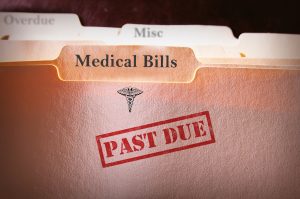Key takeaways
- Build an emergency fund so you’ll be prepared in the event of a job loss.
- Consider taking on a side hustle to build your nest egg.
- Devise a budget and work on improving spending habits.
Americans are experiencing wage growth by getting raises or higher-paying jobs. However, experts see the job market slowing down largely due to the impacts of high interest rates along with high inflation.
The unemployment rate rose to 4.1 percent in June, with the number of jobless Americans increasing to 6.8 million. What’s more, job cuts are 20 percent higher than they were this time a year ago, according to jobs data firm Challenger, Gray & Christmas.
Many workers may be wondering about their job security, as well as how to best plan for a possible sudden job loss. Here are five ways you can prepare financially in the event you suddenly find yourself unemployed in the near future.
1. Build up your emergency fund
If you were to become unemployed today, how many months’ worth of living expenses would you be able to cover from savings? Experts advise having at least three to six months’ worth of expenses saved in an emergency fund.
You’ll feel less rushed in your job search if there’s money in the bank to cover your bills for several months. This way, you’ll be able to weigh the pros and cons of each job opportunity thoroughly without feeling the need to say yes to the first one that comes your way.
A good place to keep an emergency fund is “where you can get the highest return on liquid savings,” says Barbara O’Neill, CFP, professor emerita at Rutgers University and CEO of Money Talk, a financial planning and education firm. Such a place can be a money market account at an online bank, she adds.
2. Take on a side hustle
O’Neill also recommends having a side hustle “so that you have another stream of income to fall back on.” A side hustle is something you do for income in addition to your main job, and it can be a good way to earn money while doing something you’re passionate about. Examples are selling in an online marketplace, tutoring, freelance writing or creating art.
Establishing your side hustle while you’re still employed can help ensure you have some income if you become unemployed. Even a small amount of income from a side hustle every month could help supplement what you need to take from your emergency fund or collect from unemployment.
3. Stick to a budget
Creating a budget gives you a plan for how you’ll spend your money each month, so you can live within your means and increase your savings. A budget can help you stay afloat in the face of a layoff or other sudden job loss. It should include categories for everything from your housing, transportation and groceries to monthly subscription services and your cell phone bill.
You can also use a budget to identify areas to reduce spending. Dollars you’re able to cut from various categories can be diverted to savings or debt reduction. If you ever find yourself unemployed, you’ll be grateful for having already done the work to trim your expenses in advance.
“Having a budget is the first step but the all-important follow-up is to track your spending each month and measure that against your budget,” says Greg McBride, CFA, Bankrate chief financial analyst. “Seeing where your money is going, which categories you are going overboard in, and holding yourself accountable for every dollar that is spent will help you be disciplined on savings and maximize your savings opportunities.”
4. Pay down debt
Debt repayment can be just as important as saving money when it comes to being ready for unexpected job loss. Having little to no debt when unemployed may give you more freedom to do things like switch careers or take on a dream that pays a bit less than you earned previously.
“Work on savings and debt reduction at the same time,” says Money Talk’s O’Neill. “Example: For every spare dollar, put half (50 cents) into savings and put the other half (50 cents) toward debt. If you don’t save money while you are repaying debt, you will not have the cash to fall back on when emergencies arise.”
5. Invest in job search essentials
Investing some time and money now in things to help with your job search can help you hit the ground running when the time comes. For instance, keep your resume up to date by making sure your most recent role and job duties are included.
“Your resume has much more impact on your financial future than you might think,” says Angela Jones, certified professional resume writer and managing director of Haute Resume & Career Services. “The image your resume portrays can mean a difference of $10,000 or more in [annual] salary once you’ve demonstrated the value you bring to the employer.”
In addition to updating your resume, now can be a good time to gather suitable outfits for job interviews. When you’re not in a rush to buy such clothing, it’s easier to search for sales and locate the best deals. Taking the time to purchase and coordinate several interview outfits now can save you the money and hassle of scrambling for these if you were to suddenly lose your job.
Other ways to prepare for sudden job loss
Adjust tax withholdings
One possible way to save more money now is adjusting your tax withholdings so you get more money back each paycheck instead of receiving a considerable sum when you file your taxes in the spring.
“I am not a big fan of tax over-withholding to get big refunds,” says O’Neill from Money Talks. You have to wait a year for your money, the IRS pays no interest, and you run the risk of having your refund stolen by an identity thief and delayed.”
Research health insurance
Find out what your health insurance options are if you were to become jobless. Having this information already prepared can help limit the amount of time you’d need to go without coverage if you were taken off your current employer’s plan. Potential options include joining a spouse’s employer plan, or obtaining coverage through the Consolidated Omnibus Budget Reconciliation Act (COBRA), the Affordable Care Act’s Health Insurance Marketplace or Medicaid.
Networking
Staying in touch with former coworkers and meeting new colleagues within your profession is key in landing on your feet after a layoff or other job loss. This can help you to hear about open positions through word of mouth, and you may find out about such openings as soon as they’re made available. Joining professional organizations and attending industry conferences are good ways to expand your network.
Bottom line
Finding yourself suddenly out of a job can be highly stressful, yet having done some preparation in advance can ease some of the burdens if and when that time arrives. Key aspects include establishing an emergency fund to cover several months of living expenses, having little to no debt and following a budget that allows you to live within your means.
–Bankrate’s Sheiresa McRae Ngo updated this article.
Read the full article here
















